| | | | | | | Presented By the Long-Term Stock Exchange | | | | Axios World | | By Dave Lawler ·Sep 02, 2021 | | Welcome back to Axios World. - I thought we could all use something a bit different tonight (1,737 words, 6½ minutes), so this edition is all about the end of Angela Merkel's tenure and the race to replace her. Back to regularly scheduled programming on Monday.
- Heads-up: We have a fantastic new podcast for you about a team of amateur astronauts who are about to go to space. Check it out.
| | | | | | 1 big thing: The Merkel era draws to a close | 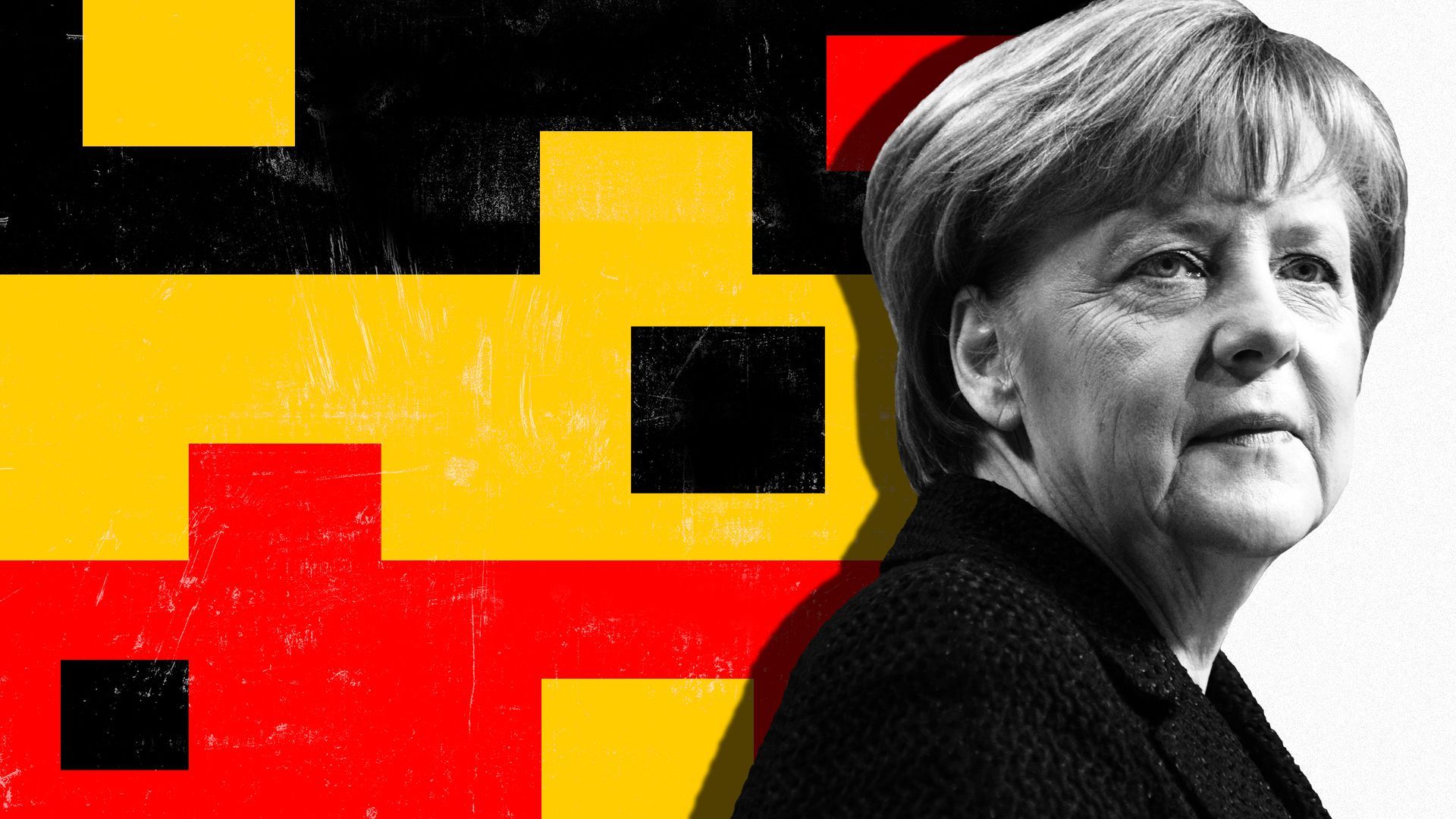 | | | Photo illustration: Shoshana Gordon/Axios. Photo: Oed/ullstein bild via Getty Images | | | | Angela Merkel looms so large over German politics after 16 years as chancellor that both leading candidates to replace her are positioning themselves as her political heir. Why it matters: Merkel has been the power broker at Europe's top table, the first call to Europe for U.S. presidents, and the only chancellor a generation of Germans has known. She remains popular at home and the face of European leadership abroad. But when Germany goes to the polls on Sept. 26, she won't be on the ballot. The big picture: Merkel will hand over the keys to Europe's economic powerhouse and one of the world's most respected countries. - She will also leave key questions unanswered: How will Germany's export-driven economy adapt to an age of global tech giants and growing trade barriers; what roles and responsibilities should the German military bear; is China friend or foe?
- Those questions will now be asked of whoever is elected on Sept. 21.
"Her time in office was coincident with a period when Germany's post-Cold War role was solidified and Germany became one of the most important countries in the world," says John Kornblum, who was U.S. ambassador to Germany while Merkel was emerging as a national figure and still resides in the country. - Kornblum recalls being impressed by Merkel's intelligence in their early meetings, but he was nonetheless surprised by her sudden political rise. "There's something about her methods, about her behavior, about the way she talks with people that makes them amenable to compromise with her," he says.
- There's also the ruthless streak that allowed her to push aside so many ambitious men to reach power — and the well-calibrated political barometer that has allowed her to keep it.
- Still, he says, "It's probably good that Merkel's leaving because she represents a different era. All of the old truisms aren't any longer valid. We don't really know what the new truths are."
Merkel's style of "careful incrementalism" has seen Germany through several crises, says Constanze Stelzenmüller of the Brookings Institution, but it increasingly appears inadequate to the current challenges. - On issues like climate change and China, Merkel has been reticent to disrupt a status quo that benefits the German economy, particularly the auto industry.
- "[Merkel's] exquisitely tempered balancing style was fantastic for brokering results at European conferences," Stelzenmüller says. "It's clearly not the best approach when you are dealing with aggressive authoritarian powers, and she has clearly not given enough thought to preparing Germany for a much more disruptive future."
That sentiment is echoed by Sudha David-Wilp of the German Marshall Fund: - "She had a lot of crises to contend with and she did provide her country with stability. But for how long is that sustainable?"
What to watch: Still, many Germans view the end of the Merkel era with trepidation. She remains the country's most popular politician by some distance, and her nickname of "Mutti," or mom, speaks to the national role she has played for so long. - "The absence of a leader as experienced, resourceful and well-networked as Angela Merkel will make itself felt in times of disruption and insecurity," Stelzenmüller predicts.
|     | | | | | | 2. Big shoes to fill | 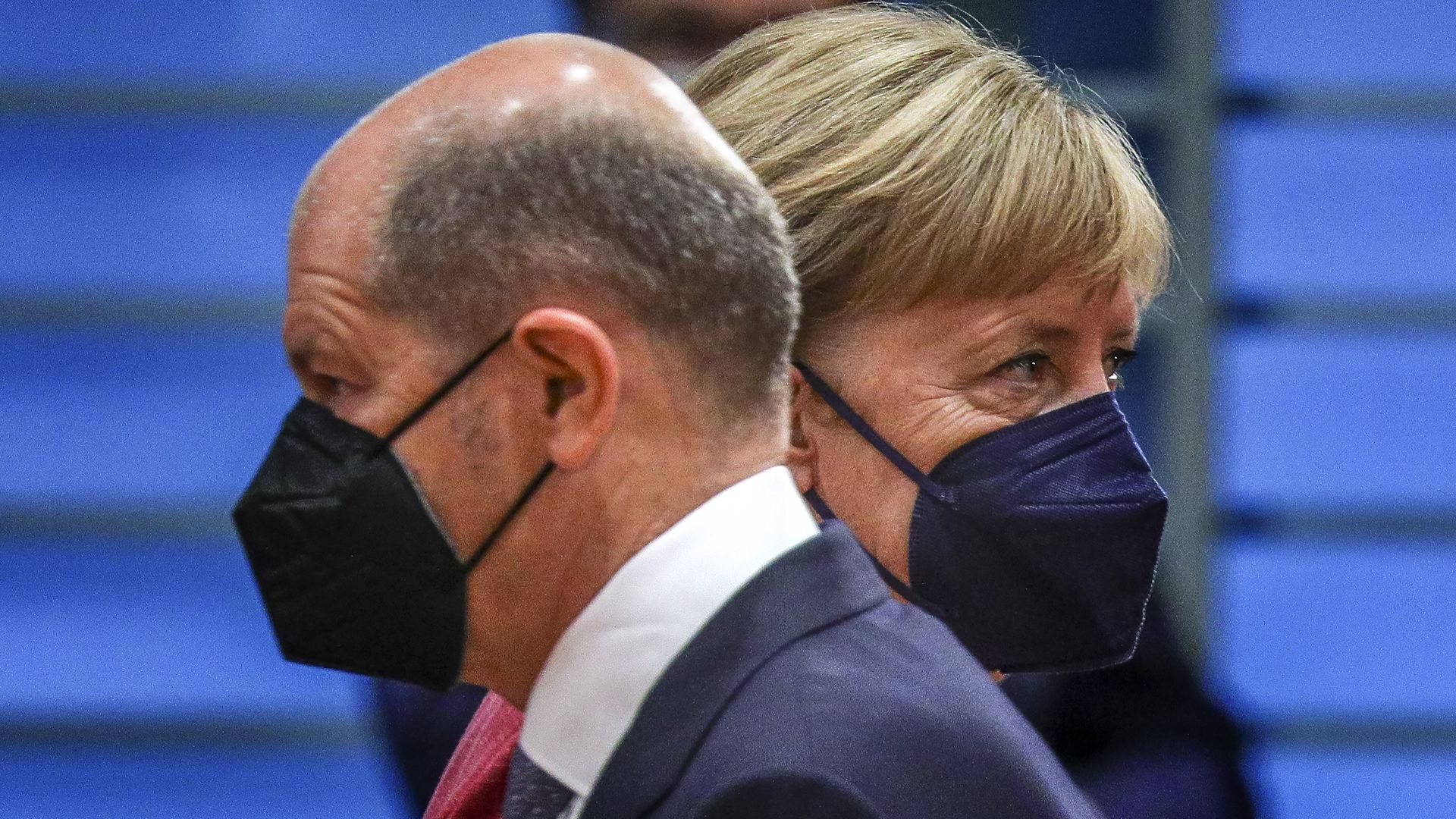 | | | Merkel and Olaf Scholz. Photo: Omer Messinger/Getty Images | | | | "The new chancellor, whoever that is, won't have the same place on the international scene at the beginning. That's for sure," a European diplomat tells Axios. Behind the scenes: Another senior European official who has seen Merkel in action during marathon negotiating sessions in Brussels praises her patience, tirelessness, attention to detail and instinctive sense of how far her counterparts can be pushed. - Even at 4am, the official recalls, Merkel was in command of the facts and of the room, even if hers wasn't always the loudest voice.
- As her counterparts tired or backed off their more hardline stances, the German chancellor moved in to forge the final compromises.
- It's not just that Merkel was highly skilled at negotiating, the official tells Axios, she seemed to love doing it.
Looking back on the deals struck during Europe's debt and migration crises, however imperfect they may have been, the official says, "I'm not sure there was any other leader who could have done it." - Greeks have never forgiven Merkel for her insistence on austerity during the debt crisis, and there were frustrations in Paris at times over her cautious approach to European integration.
- Still, a median of 83% of people across eight EU countries polled by Pew still trust the German chancellor to "do the right thing regarding world affairs."
The same is true for political leaders, a French official says. - "I think they knew how to work with her. She was reassuring in the way that we knew how to tango with her."
- "International relations are also based on personal relations," the official adds. "And when you have a permanent figure that was at the summits for 16 years, when it changes, of course it's a big change, although we are sure that the French-German couple will remain very strong."
Merkel's exit may provide an opening for France, which will hold the EU presidency for the first half of next year, to drive the European agenda. |     | | | | | | 3. The race to replace Merkel |  Data: Forsa; Chart: Danielle Alberti/Axios Merkel made an unusually direct intervention in the election race this week, claiming that there would be a "huge difference for the future of Germany" if leadership passed from her to Olaf Scholz, the leader of the Social Democrats (SPD). Why it matters: Both Scholz and Armin Laschet, Merkel's successor as leader of the Christian Democrats (CDU), are effectively running as continuity candidates. - Scholz has been Merkel's finance minister and vice chancellor for the past three years, and Merkel has spent 12 of her 16 years in power leading "grand coalitions" with the SPD — often co-opting the center-left party's policies.
- Indeed, voters may see more parallels to Merkel in the technocratic Scholz than the jovial, gaffe-prone Laschet, who managed just 10% in a recent poll of Germans' preferred chancellor candidates, to 31% for Scholz.
- There are several possible coalition combinations depending on how the six major parties fare, but both leading chancellor candidates are centrists in the Merkel mold.
- "The new chancellor is going to be a male version of Merkel, and there's not going to be any real change" on core issues, says Kornblum.
Yes, but: The consensus is shifting in Berlin when it comes to relations with Russia and in particular China, David-Wilp notes. - She says it will be difficult for the next chancellor to "walk the line that Merkel has," of speaking up for democratic values and sticking close to the U.S., while also protecting the German export machine.
- Merkel has delayed a decision on whether to allow Huawei into Germany's 5G networks and helped seal a (since frozen) EU-China investment deal in December, over the objections of the incoming Biden administration.
- "It's gotten to the point that it's splitting Germany and Europe," David-Wilp says.
|     | | | | | | A message from the Long-Term Stock Exchange | | The Long-Term Stock Exchange announces its first listings | | | 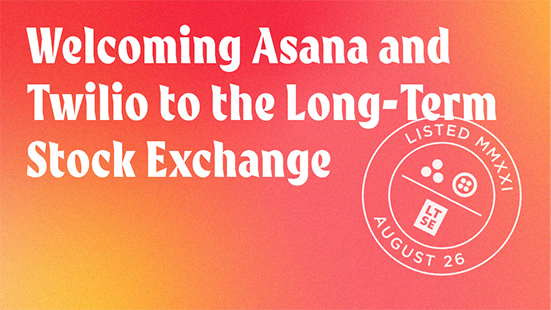 | | | | Asana and Twilio are launching their listings on LTSE, becoming the first to choose a new exchange focused on elevating governance. - LTSE's listing standards give companies a framework to thrive in the public markets through stronger governance and investor alliances.
View the listing launch. | | | | | | 4. A legacy of stability and survival |  Data: Axios Research; Chart: Kavya Beheraj/Axios Merkel was raised in Communist East Germany and took power just 15 years after reunification. - After she entered federal politics, she frequently reminded interlocutors, that she was not "from here" — meaning West Germany, or the West in general.
She is now easily the longest-serving leader of a major Western democracy. - Merkel established warm relations with George W. Bush, partnered with Barack Obama and survived Donald Trump. She was the first European leader invited to Joe Biden's White House.
- Merkel had a way of ensuring that any disagreements with Washington never evolved into a confrontation, Kornblum recalls. "I can't think of any time when she was somehow openly, blatantly, actively opposing something."
Russian President Vladimir Putin is one of the few contemporaries now set to outlast her. - Merkel coordinated the sanctions push against Putin over the annexation of Crimea and harbored an ailing Alexei Navalny last year, all while pursing the controversial Nord Stream 2 gas pipeline.
- She has long favored dialogue with Putin over attempts to isolate him. The two famously speak each other's languages.
At home, her policies tended to be cautious and poll-tested, except in her legacy-defining decision to open Germany's borders to Syrian refugees. - As Bloomberg's Andreas Kluth quips, "Merkel rarely divulges what she thinks before she has to, and sometimes not even then."
- Her speeches are willfully boring, her methods methodical and, by now, they're reassuringly familiar.
- David-Wilp has spotted her twice at the grocery store. The other shoppers left the world's most powerful woman alone, to shop in peace. It's what they'd come to expect from their chancellor.
|     | | | | | | Bonus: Where in the world? | | Screengrab via Apple Maps We're staying in Germany tonight. The red pin marks Berlin. Germany's next four largest cities are numbered 1–4 (not in order of population). Can you name them? Scroll to the bottom for the answer. |     | | | | | | 5. The end of an era | 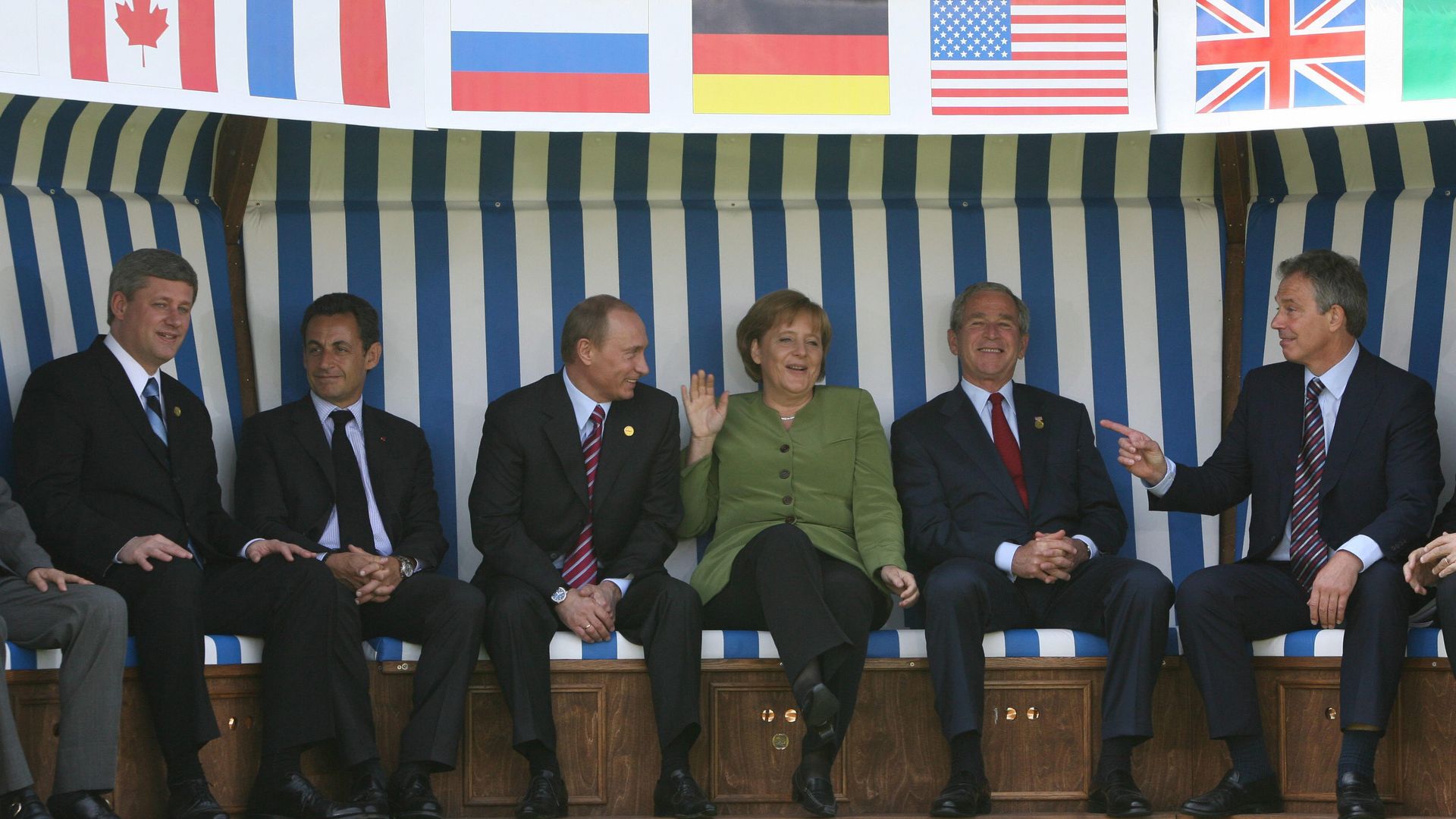 | | | Merkel has a laugh with Vladimir Putin and George Bush at the 2007 G7. Photo: Peter Macdiarmid/Getty Images | | | | Merkel invites each new French prime minister to the chancellery, the French official says. - When then-Prime Minister Edouard Philippe visited in 2017, the official recalls, "She told him, 'Well, this is my fourth president, you are my sixth prime minister, everyone has come to me with a very ambitious reform plan."
- Merkel advised Philippe to act on those plans quickly, while his popularity remained high. "It was kind of the advice from the old guard to the new guard that was arriving," the official says.
It's ironic advice coming from Merkel, who never carried out any major economic reforms. Instead, she pursued a steady course through choppy seas. After 16 years, she leaves behind a more prosperous, more self-assured and more influential country. - But, as David-Wilp notes, she never really attempted to answer an all-important question: "What kind of Europe does Germany want, and what is it willing to give up in order to have a Europe that's more powerful on the world stage?"
- Soon, that will be someone else's question to answer.
|     | | | | | | 6. Data du jour: Cost of air pollution |  The average person is losing about 2.2 years of life expectancy due to air pollution, according to new research by the University of Chicago's Energy Policy Institute. Go deeper. |     | | | | | | 7. Stories we're watching | 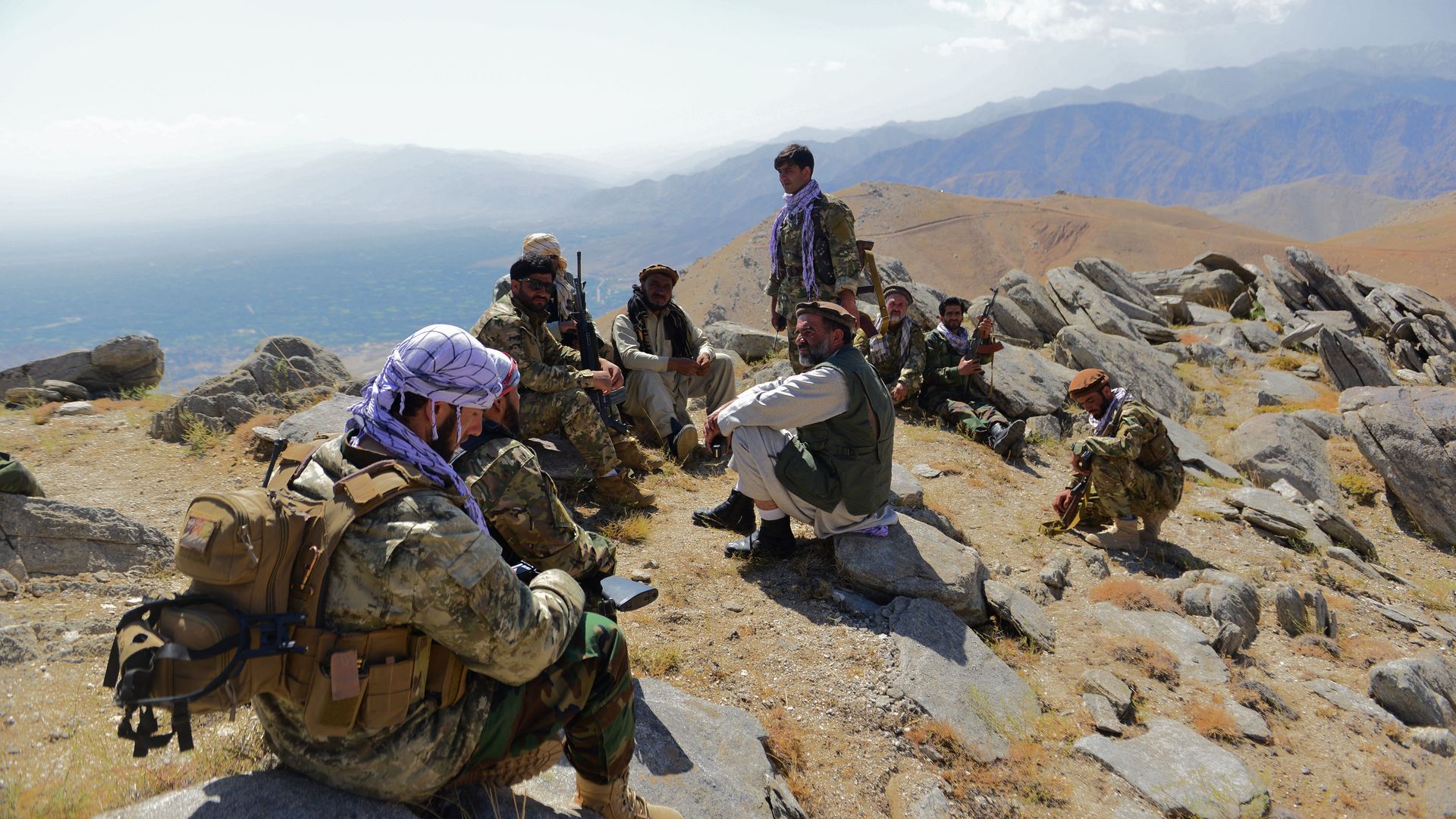 | | | Fighters in the anti-Taliban resistance in Afghanistan's breathtaking Panjshir province. Photo: Ahmad Sahel Arman/AFP via Getty | | | - Afghanistan's humanitarian crisis: Food running out; Sanctions will hurt; Banks in the crosshairs; UN warning
- 24,000 Afghans have reached U.S.
- U.S.-China tensions spill into climate talks
- Biden and Israeli PM renewed covert nukes agreement
- Russia vs. Apple, Google on Navalny app
- Frosty Turkey-UAE relations begin to thaw
- Israeli booster data gives hope to U.S.
Quoted: "Do you seriously think my party will accept this offer for talks with Frau Merkel? … Under her leadership, she will never get a coalition with my party." — Chancellor Gerhard Schröder after finishing narrowly behind Merkel's CDU in the 2005 elections. He was wrong about that. |     | | | | | | A message from the Long-Term Stock Exchange | | The Long-Term Stock Exchange announces its first listings | | | 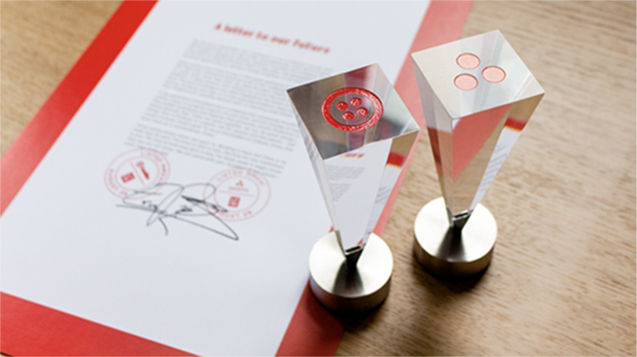 | | | | Asana and Twilio are launching their listings on LTSE, becoming the first to choose a new exchange focused on elevating governance. - LTSE's listing standards give companies a framework to thrive in the public markets through stronger governance and investor alliances.
View the listing launch. | | | | Answers: 1 = Hamburg; 2 = Cologne; 3 = Frankfurt; 4 = Munich. |  | | It'll help you deliver employee communications more effectively. | | | | | | Axios thanks our partners for supporting our newsletters. If you're interested in advertising, learn more here.
Sponsorship has no influence on editorial content. Axios, 3100 Clarendon Blvd, Suite 1300, Arlington VA 22201 | | | You received this email because you signed up for newsletters from Axios.
Change your preferences or unsubscribe here. | | | Was this email forwarded to you?
Sign up now to get Axios in your inbox. | | | | Follow Axios on social media:    | | | | | |












No comments:
Post a Comment